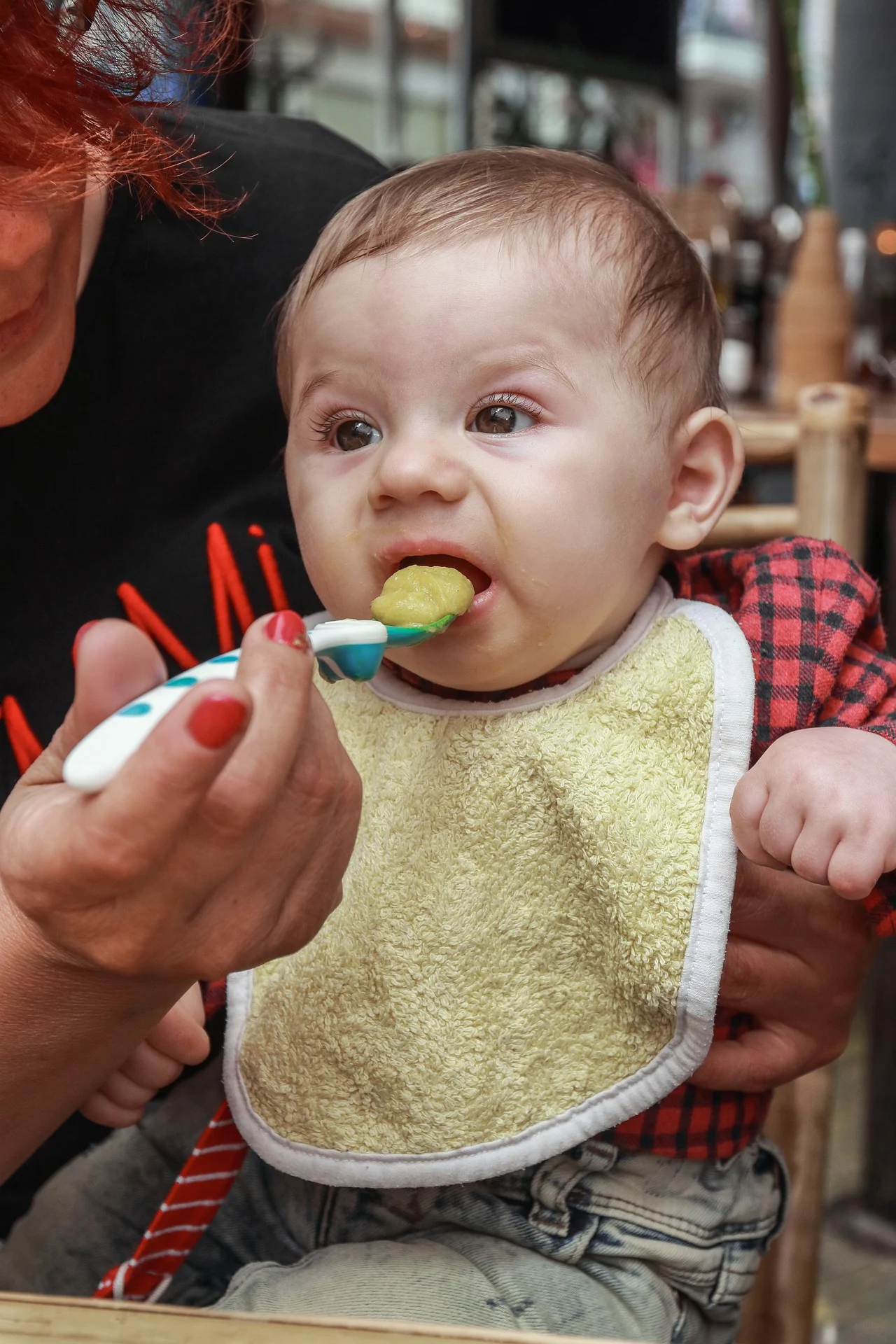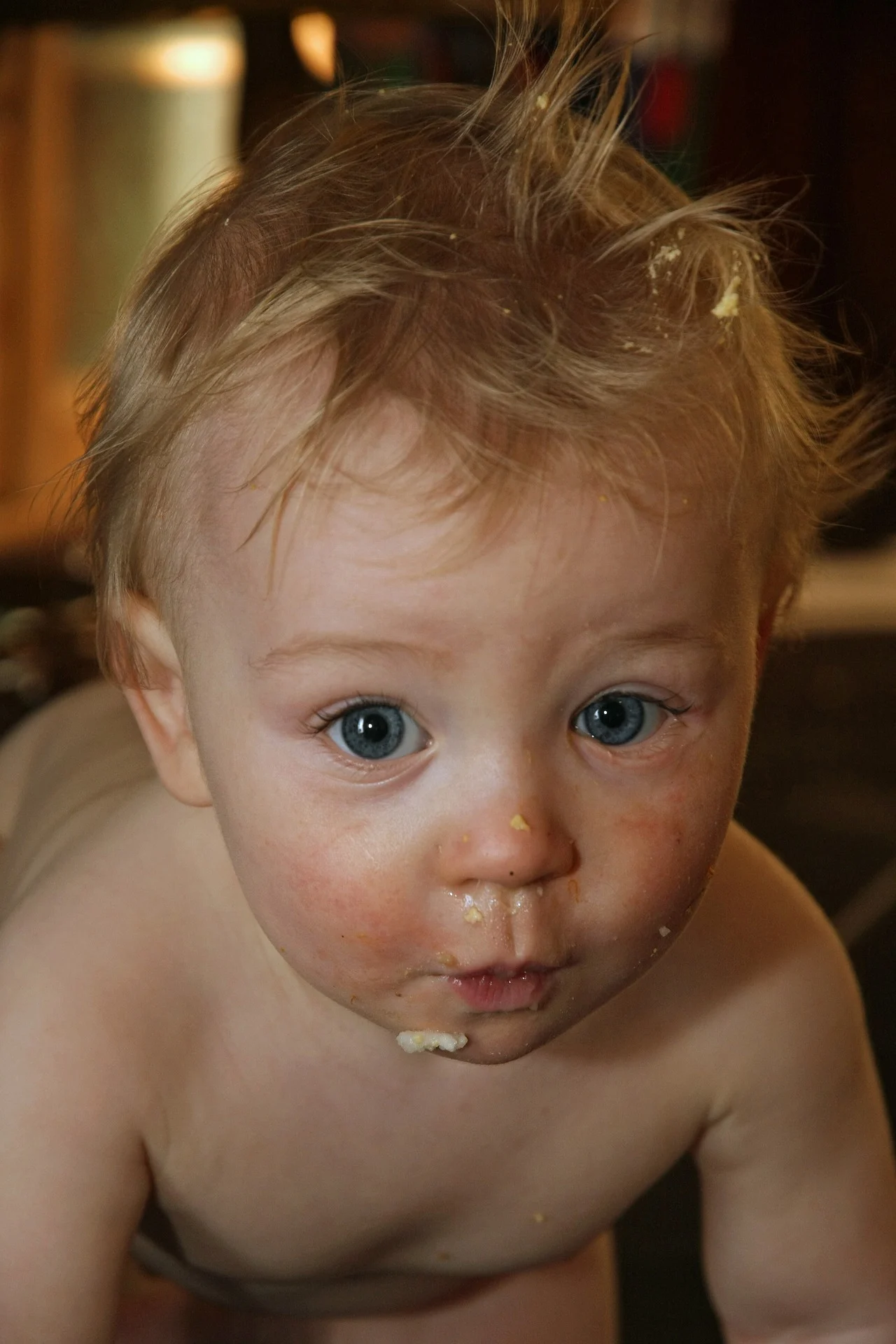Custard is a popular pudding choice in the UK and has been a part of our diets for decades. Custard is made by combining milk and eggs and then gently heating them to form a thick and creamy dessert. It’s often sweetened with sugar and vanilla, then thickened with flour to form a tasty and easily digestible baby led weaning dessert.
If you are a custard fan, you’re probably wondering, can babies have custard? and the answer is yes! In fact, babies usually love custard due to its sweet taste and smooth texture.

Is Custard A Healthy Food Choice For Babies?
When it comes to the weaning process, parents are always keen to ensure that the food they’re serving their baby is healthy and safe. As such, asking the question, can babies have custard?, is a sensible query to make if you’re planning to introduce your baby to their first foods soon. I’ve put together a list of some of the most frequently asked questions about offering custard as a first food choice and we will be looking at the following concerns in this article:
- The Benefits Of Feeding Your Baby Custard
- Side Effects That May Come From Feeding Your Baby Custard
- Is Custard A Good First Food For Baby Led Weaning?
Let’s take a look at each point in turn.
The Benefits Of Feeding Your Baby Custard
Not only is custard a delicious dessert to enjoy at the end of a meal, it also has some great health benefits that can help with your baby’s development. It’s important to note that the way in which your custard is made can determine the developmental benefits, for example custard made freshly will contain more carbohydrates and fats compared to custard made from powder.
The milk and eggs in custard can offer babies several vital nutrients such as calcium, protein and vitamin D. These vitamins and minerals are responsible for healthy teeth and bones, improving eyesight, and muscle development.
Custard is also a smooth, sweet, and easily digestible food which means that it’s often adored by babies and young children. If you’re looking for a sweet and simple dessert to share with your baby, custard is definitely a great contender.

Side Effects That May Come From Feeding Your Baby Custard
When asking the question, can babies have custard?, you will want to consider any potential side effects that may occur as a result of consumption.
For example, custard does contain a lot of sugar, especially if it has been bought from the store rather than made from home. Too much sugar can cause weight gain as well as tooth decay in babies, affect your baby’s sleep schedule, and even result in early diabetes if consumed regularly. If you want to ensure that your baby isn’t eating too much sugar, it is best to try offering a homemade sugar free recipe.
Custard is also composed of several common food allergens including milk and eggs, therefore it’s not suitable for those who are lactose intolerant or have allergies.
Is Custard A Good First Food For Baby Led Weaning?
Baby led weaning is a fantastic way to start getting your baby used to eating solid foods. Custard is a good option to start the process off with as it has a sweet taste and a smooth texture that babies find easy to swallow. Custard is also easy for little ones to digest and has a good mix of vitamins and minerals in it that support their developmental health.
Once your baby has mastered eating smooth foods, such as custard, you may want to start to introduce them to desserts that have more texture, such as rice pudding. Additionally, mixing pureed fruit in with custard is a good way for babies to explore new flavours alongside a food they’re already familiar with.

Which Type Of Custard Is Healthier?
What product is best when considering the question, can babies have custard? There are three types of custard that you can offer your baby in moderation, these are:
- Ready made custard – bought in cartons or tins
- Custard powders
- Homemade custard
Both ready made custards and custard powders contain high levels of sugar, preservatives, artificial colourings, and flavourings, therefore it’s best to avoid giving your babies these products.
Instead, the best type of custard to offer your baby is one that you have made from home using fresh ingredients. There are numerous varieties of custard that you can make at home, including sugar free custard, egg free custard, and even vegan custard.
By making easy custards at home, you are in control of the ingredients list and are therefore in a better position to provide custard as part of a healthy, balanced diet.
How to prepare custard based desserts for your baby.
Babies and toddlers should be offered healthy, balanced meals that are low in salt and sugar. In order to provide desserts such as custard, you’ll want to ensure that you’ve considered the ingredients you’ve used when producing your baby’s meals throughout the day. Too much salt and sugar is bad for your baby, so bear in mind that the type of sweet treats that adults usually enjoy for dessert are likely to be too sugary for babies and young children.
In order to keep your custard dessert healthy for your baby, you should avoid adding any confectionery; this includes sweets, chocolate, and chocolate spread. These food products are all extremely high in sugar as well as other additives and preservatives.
Instead of using chocolate or sweets to add flavour to your baby’s custard, consider using fruit. Fruits contain natural sugars that make them great for sweetening desserts like custards and rice puddings. When using fruit to naturally sweeten desserts, it’s worth remembering that some sour fruits such as rhubarb will require a small amount of sugar when stewed in order to make them less bitter. Canned fruit can also be used, but it is best to opt for fruit that has been canned in natural juice rather than syrup.

Can babies have custard?
Dessert is an important part of your baby’s weaning journey and is a fun treat to be offered after they’ve established a good weaning routine. In this article we have covered the frequently asked question, can babies have custard? and talked about the benefits and potential side effects of feeding your baby custard. Remember that you should always consider potential allergens when offering your baby any new foods and be sure to watch the sugar content of the food you are offering your baby when it comes to introducing new desserts into their diet.
